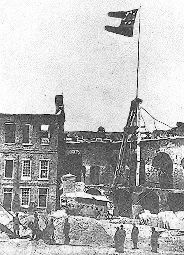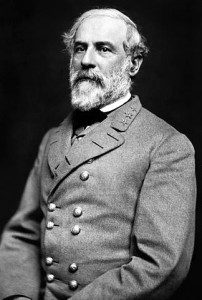April 12 to 14, 1861
Confederate Edmund Ruffin fires the first shot of the Civil War at 4:30 in the morning of April 12, when he fires a single mortar upon Union held Fort Sumter in the harbor of Charleston, South Carolina. It is questionable that Ruffin actually fired the first shot of the Civil War. Strangely, it might be said that Ruffin fired one of the last shots of the Civil War when he committed suicide in April, 1865 after he learned of Lee’s surrender at Appomattox Court House.
The Confederates bombarded Fort Sumter for 34 hours. During the bombardment, the Confederates and the Yankees combined fired approximately 4,000 shells. The formal surrender of Fort Sumter takes place on April 14.Oddly, not a single Johnny Reb or Billy Yank died during the intense bombardment. However, there was an accidental explosion that took lives during the formal surrender ceremonies at Fort Sumter. A big gun was fired as a salute and somehow a burning piece of debris (most likely part of a powder bag) landed on a pile of cartridges. These cartridges exploded, instantly killing a Yankee private, and badly injuring another five. One of the injured Yankees died a few days later.
On April 15, Lincoln issued a proclamation declaring that an insurrection existed, and that 75,000 militia were being calling out from the Northern states. President Lincoln also stated that a special session of Congress would convene on July 4.
The Civil War had begun.
Quotes about Fort Sumter:
“We shall be in one of the bloodiest civil wars that history has recorded.”
-Alexander Stephens was the Confederate vice president, this is his prediction after Fort Sumter.
-Some words of Frederick Douglass in May of 1861, after the Civil War began with the bombardment of Fort Sumter.
“The firing on that fort will inaugurate a civil war greater than any the world has yet seen…you will lose us every friend at the North. You will wantonly strike a hornet’s nest which extends from mountains to ocean. Legions now quiet will swarm out and sting us to death. It is unnecessary. It puts us in the wrong. It is fatal.”
-Robert Toombs, his words to Jefferson Davis regarding Fort Sumter. Toombs was Confederate Secretary of State but later resigned this position to become a Brigadier General and fight in battles for the Confederacy.
“Abe Linkhorn,
We received your proklamation, and as you have put us on very short notis, a few of us boys have conkluded to write you, and ax for a little more time. The fact is, we are most obleeged to have a few more days, for the way things are happening, it is utterly onpossible for us to disperse in twenty days. I tried my darndest yisterday to disperse and retire, but it was no go.”
-Bill Arp. When Fort Sumter was bombarded, Abraham Lincoln put out a proclamation asking the Rebels to “disperse and retire.” The above is a letter to Lincoln that appeared in a newspaper. “Bill Arp” is the pen name of humorist Charles Henry Smith.
 My book 501 Civil War Quotes and Notes features quotes made before, during, and after the Civil War. Each quote has an informative note to explain the circumstances and background of the quote. Learn Civil War history from the spoken words and writings of the military commanders, political leaders, the Billy Yanks and Johnny Rebs who fought in the battles, the abolitionists who strove for the freedom of the slaves, the descriptions of battles, and the citizens who suffered at home. Their voices tell us the who, what, where, when, and why of the Civil War. Available as a Kindle device e-book or as a paperback. Get 501 Civil War Quotes and Notes now!
My book 501 Civil War Quotes and Notes features quotes made before, during, and after the Civil War. Each quote has an informative note to explain the circumstances and background of the quote. Learn Civil War history from the spoken words and writings of the military commanders, political leaders, the Billy Yanks and Johnny Rebs who fought in the battles, the abolitionists who strove for the freedom of the slaves, the descriptions of battles, and the citizens who suffered at home. Their voices tell us the who, what, where, when, and why of the Civil War. Available as a Kindle device e-book or as a paperback. Get 501 Civil War Quotes and Notes now!



